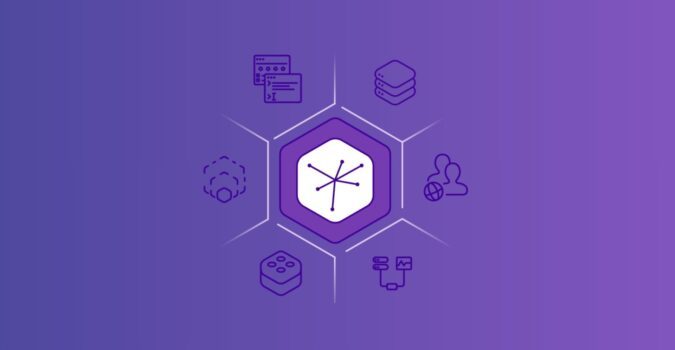Why AI Agent Platforms Are the Backbone of Scalable GenAI Solutions
AI agents, the latest critical trend in the future of generative AI, are on the rise. GenAI-powered agents can work 24/7 in the background, using foundational models to execute complex and layered workflows. A recent Gartner study finds that agentic AI will autonomously resolve 80% of common customer service issues without human intervention, leading to a 30% reduction in operational costs.
To effectively implement an AI agent workforce, however, organizations must leverage an AI agent platform, which provides the critical infrastructure to deploy and scale these agents in real-world business environments. With the right AI platform, your organization can lay the foundation for long-term success.
In this blog, we’ll explore what makes a great AI agent platform, how it supports agentic AI, and what to look for when evaluating one.
In This Article
- What Is an AI Agent Platform?
- 6 Capabilities of Modern AI Agent Platforms
- The Role of Agentforce in Enterprise AI Implementation
- Choosing the Right Platform for Your Use Case
- Real-World Use Cases for AI Agent Platforms
- How Agentic AI Is Evolving with Platforms
- Turning Your AI Strategy into Your Business Advantage
What Is An AI Agent Platform?
Your AI agent platform is a comprehensive software environment that supports the end-to-end lifecycle of AI agents—from development and training to deployment, monitoring, and governance.
Unlike standalone tools, this type of platform offers a centralized ecosystem where intelligent agents can thrive and scale.
As you begin to incorporate AI agents into your organization’s workflow, these platforms serve as the helpful digital infrastructure for agents to function independently, communicate with your systems, and adapt over time. In addition, these AI agent platforms serve as the connector between generative AI reasoning and the systems where business happens.
With the right platform, you can seamlessly manage:
- Integration with enterprise systems and APIs
- Memory management and access to structured and unstructured data
- Multi-agent coordination and real-time task delegation
- Governance, observability, and performance monitoring
- User-friendly interfaces for configuration, management, and analytics
6 Capabilities of Modern AI Agent Platforms
As your organization embraces AI-first strategies, understanding what distinguishes a strong AI agent platform from an average one is essential. Consider these six capabilities that both enable seamless deployment but also ensure long-term scalability, resilience, and adaptability.
Choosing a platform without these core capabilities risks stalling innovation before it even starts.
1. Tool and System Integration
A truly effective AI agent platform should plug into your digital infrastructure without friction. That means prebuilt connectors for platforms like Salesforce and Slack, as well as extensible APIs to link with your proprietary tools and databases.
This seamless integration ensures agents have access to the data and systems they need to act meaningfully within your unique ecosystem, enabling real-time automation, contextual intelligence, and the ability to evolve alongside your stack.
2. Agent Lifecycle Management
Building an agent is just the start. Modern platforms must support the full lifecycle of an agentic workforce—from developing your agent fleet to evolving to meet future needs.
This includes tools for testing agent behavior, monitoring real-world performance, managing updates, and logging activity for audit and compliance. Lifecycle management ensures that your events always remain effective, secure, and aligned with changing business goals.
3. Secure Memory and Data Access
Without access to organizational memory, AI agents can’t offer the value that companies need, but this access must be secure.
The best platforms provide robust data pipelines to CRMs, ERPs, and knowledge bases while enforcing enterprise-grade security protocols, such as SSO, role-based permissions, and encryption. With these features, your agents can easily retrieve relevant data on demand and maintain continuity across interactions.
4. Multi-Agent Collaboration
Complex processes are common with many enterprise organizations, and agentic AI fleets are designed to support these workflows. Prioritize an AI agent platform that enables agents to hand off tasks, share context, and co-manage workflows.
For example, a sales agent might engage a pricing agent mid-conversation or a recruiting agent may escalate to an onboarding agent once a candidate is hired. This level of coordination helps unlock more powerful and human-like workflows.
5. Human-in-the-Loop Controls
Automation must exist alongside accountability, particularly as enterprises navigate highly regulated environments. Human-in-the-loop (HITL) functionality allows operators to review decisions, approve escalations, or override agent behavior.
These controls are essential for compliance, user trust, and change management—especially in industries like healthcare, finance, and insurance. Great platforms allow customization of these rules by use case or user type.
6. LLM and Workflow Orchestration
At the heart of an AI agent’s intelligence is its ability to combine reasoning from a large language model (LLM) with real-time action through workflows.
Platforms must orchestrate this process efficiently. Making sure agents choose the right tool for the right task helps to minimize errors and complete multi-step actions across tools without dropping context. This level of aptitude is where tactical automation becomes strategic transformation.
The Role of Agentforce in Enterprise AI Implementation
Salesforce’s Agentforce is a leading example of an enterprise-ready AI agent platform, built to power real business outcomes. Going far beyond a typical chat interface, Agenforce allows companies to leverage AI agents to manage low-value tasks autonomously and free your team to focus on strategic, complex work.
Agentforce enables teams to:
- Deploy AI agents directly within Salesforce and adjacent workflows
- Automate complex processes across service, sales, and staffing
- Leverage real-time and historical data for intelligent reasoning
- Build scalable systems with governance and control built-in
If your team is committed to becoming an AI-first enterprise, platforms like Agentforce help to bridge the gap between generative AI and business-critical workflows. At LaunchPad Lab, we see organizations use Agenforce for AI implementation at scale without needing to overhaul their tech stack from the ground up.
For companies already invested in the Salesforce ecosystem, adding Agenforce to your current stack offers a seamless, strategic path to building agentic AI into the heart of operations.
Choosing the Right Platform for Your Use Case
The right platform depends heavily on where your organization sits on the AI maturity curve. (Not sure where your organization is on the AI maturity curve? Read this article for more.)
For early-stage adopters, ease of use and integration with core systems may be the top priority when selecting a platform. But for more mature organizations, customization, depth, and control over data governance might become critical differentiators. Try to balance the needs of your organization in its current state, alongside the potential needs of your future evolution.
Remember: Not every platform is the right fit for every business. When selecting an AI agent platform, think beyond technical specs. You’re choosing a foundation that must align with your strategic goals, team workflows, and long-term roadmap.
Here are a few questions to help inform your platform evaluation:
- Business Alignment: Does the platform integrate easily into your existing ecosystem? Can it support your most important workflows and data sources?
- Scalability: As your team, use cases, and data grow, can the platform scale with minimal friction, both technically and operationally?
- Usability: Can non-technical users configure agents or monitor their performance? Is the interface intuitive enough for cross-functional collaboration?
- Security and Compliance: Does the platform support SSO, role-based access, and data encryption? Can it help you stay audit-ready and compliant with regulations like GDPR or HIPAA?
- Customization: Can you define your own actions, reasoning rules, or workflows to tailor agent behavior to your business context?
Real-World Use Cases for AI Agent Platforms
AI agent platforms are transforming operations across industries. By powering intelligent automation, coordination, and decision-making at scale, these platforms offer measurable benefits in both speed and quality.
Financial Services: Banks and insurance providers are leveraging AI agents for tasks like KYC (Know Your Customer) validation and compliance checks. An AI agent platform integrates these agents with internal systems and public databases, allowing them to verify identities, flag inconsistencies, and ensure regulatory adherence—all in a matter of seconds.
Healthcare: Hospitals and clinics are using agentic platforms to streamline patient intake and insurance verification. AI agents automatically gather information from EHR systems and payer portals, validate insurance coverage, and prep case files before a patient even steps into the room, saving hours in administrative time and improving care efficiency.
Logistics: In the logistics sector, AI agents coordinate shipment routing and warehouse operations. One IBM study finds that organizations with higher AI investment in supply chain operations report revenue growth 61% greater than their peers. With the support of a robust AI agent platform, these agents operate with minimal human intervention while ensuring operational continuity.
How Agentic AI Is Evolving with Platforms
On a fundamental level, agentic AI marks a shift in how we think about autonomy. Rather than relying on static automation or linear scripts, agentic systems learn, adapt, and act independently to reach a preset goal. AI agent platforms make this possible by providing the reasoning engines and contextual memory required for autonomous action.
When reviewing agentic AI platforms, keep an eye on some of these features that will help your AI platform evolve in the future:
- Share memory across interactions and teams
- Reason across diverse data sets and business contexts
- Trigger workflows automatically based on conditions or user inputs
- Learn from past decisions to optimize future actions
See Agentic AI in Action
Take Prosci, for instance. They developed a proprietary AI coach trained on thousands of internal documents, enabling their clients to access expert-level change management guidance at any time. This illustrates how AI agents, when paired with domain-specific knowledge, can offer scalable, always-on support that mirrors expert human interaction.
Turning Your AI Strategy into Your Business Advantage
As automation and AI move from pilots to production, the decisions you make today will define your operational agility and competitive edge for years to come. AI agent platforms offer the structure and flexibility needed to transition from fragmented automation to cohesive, intelligent systems capable of handling real-world complexity.
Whether you’re just getting started or scaling an AI-first strategy, investing in the right AI agent platform sets the foundation for what’s next. At LaunchPad Lab, we help companies design and implement custom agentic AI platforms that deliver real business results. Let’s build smarter together.



